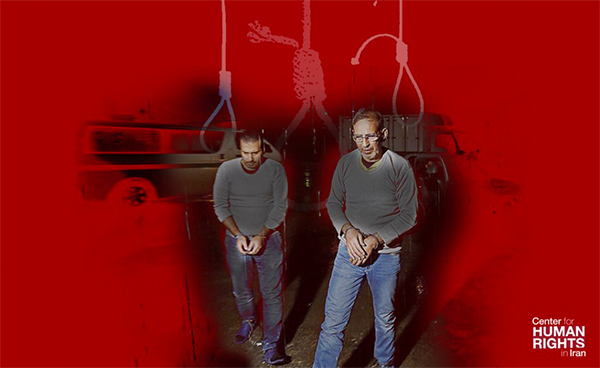
Vahid Mazloumin and Mohammad Esmail Ghassem Both Hanged at Dawn Despite Denials of Due Process and the Right to a Fair Trial
November 14, 2018—The hanging today of two individuals who were convicted of economic crimes in Iran’s new corruption courts is unlawful and inhumane, as these courts deny due process and do not allow for fair trials, the Center for Human Rights in Iran (CHRI) said today.
- There should be an immediate moratorium on carrying out any sentences issued by these courts, especially the three other death sentences that have been issued so far by them, CHRI said.
- There should also be an immediate halt on the activities of these courts until their procedures fully allow for due process and fair trial standards, and all sentences issued thus far should be mandated for review, CHRI added.
“Iran’s hanging of people who have been convicted in courts without a fair trial is a blatant violation of law,” said Hadi Ghaemi, CHRI executive director. “The international community must register its forceful condemnation of these kangaroo courts and the executions that are being carried out under their direction.”
Vahid Mazloumin and Mohammad Esmail Ghassemi, two of the five people sentenced to death so far by the special economic corruption courts, we’re hanged at dawn in Tehran on November 14, 2018.
Iranian Nobel Peace Laureate Shirin Ebadi condemned the courts in an interview with CHRI on November 13, 2018, describing the quick prosecution and heavy sentences issued as “a masquerade of justice.” The prominent lawyer said, “Instead of implementing justice, the state is pretending to be seeking justice, meaning that …judicial procedures, bringing charges, the right to legal counsel — none of these things are clear in these cases.…”
Ebadi also expressed concern about the short duration of the trials. “From my experience, usually the appeal process takes more than two years. But if cases are closed in just a few weeks we have to believe the prosecutions are being deliberately expedited and in my opinion that is because they want to quiet down the people.”
The courts were set up by Iran’s judiciary and approved by Supreme Leader Ali Khamenei in August 2018 to try individuals accused of economic corruption. They severely violate the right to due process and to a fair trial on many levels. Among other violations, they:
- Do not allow adequate time for defense procedures or appeal reviews.
- Restrict the right to choose counsel to the short list of state-approved lawyers that are designated for “national security” cases.
- Do not allow any appeal process except in cases involving the death penalty, and then appeals can only be made to the Supreme Court within 10 days.
Mazloumin, known as the “(Gold) Coin King” who was arrested on July 1, 2018, said in an interview with the Mizan News Agency published after he was hanged, “I loved my job. Especially dealing coins. There’s nothing mysterious about the market, if you ask me. It’s just a perpetual supply and demand in society.”
Mohammad Esmail Ghassemi, known as Mohammad Salem, began trading in the currency and gold market in 1993 and worked closely with Mazloumin. Asked in an interview with Mizan published on November 14 why Mazloumin was called the (Gold) Coin King, he said: “When someone trades $30 million a day and has the ability to read the market, his name spreads everywhere.”
The three other individuals sentenced to death so far by these courts are: Dariush Ebrahimian Bilandi and Younes Bahaeddini who were sentenced by the special court for economic crimes in Fars Province on November 6 for “organized disruption of the country’s banking and economic network” (the two have appealed to the Supreme Court) and Hamid Bagheri, who was sentenced on October 1 along with Mazloumin and Esmaili. Bagheri’s death sentence has been transferred to another branch of the Supreme Court for review, his lawyer Mr. Ramezani told Mehr news agency on November 5.
On October 21, Judiciary Spokesman Gholam-Hossein Mohseni Ejei announced that the Supreme Court had upheld the death sentences issued against Vahid Mazloomin and Mohammad Esmail Ghassemi.
“In four months the authorities arrested, investigated, tried, convicted, reviewed and executed two men—neither of whom were given adequate provision for defense or due process,” said Ghaemi. “This is a slaughtering of justice and demonstrates complete disregard for the rule of law.”
For interviews, contact:
Hadi Ghaemi
+1-917-669-5996
hadighaemi@iranhumanrights.org
Visit our website: www.iranhumanrights.or
